Our History
Nazareth's story is one of responding to the needs of the time, and of creating success against all odds.
Asked by Roman Catholic Bishop of Rochester Thomas Hickey to found a college for women — an underserved population then — the Sisters of St. Joseph responded. Despite traditional gender roles and a prevailing anti-Catholic bias, the sisters led the way to success. With newly-minted doctorates from Fordham University in New York City, and extensive graduate study at Oxford University and the Sorbonne, five Sisters of St. Joseph launched Nazareth College with the first 25 students starting classes on September 24, 1924, which came to be known as Naz Day.
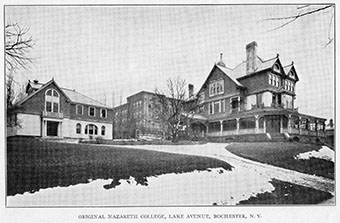
Original location, 1924
Nazareth opened in September 1924 in a mansion called the "glass house" on Lake Avenue in Rochester, then moved to Augustine Street in Rochester in 1928 to accommodate growing enrollment.
Nazareth moved to its current home, East Avenue in Pittsford, in 1942.
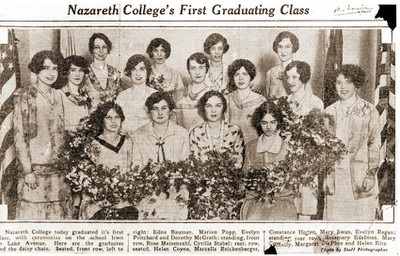
Changemaker education
One of the first courses offered at Nazareth focused on global economics, with students studying and making recommendations about economic issues around the world.
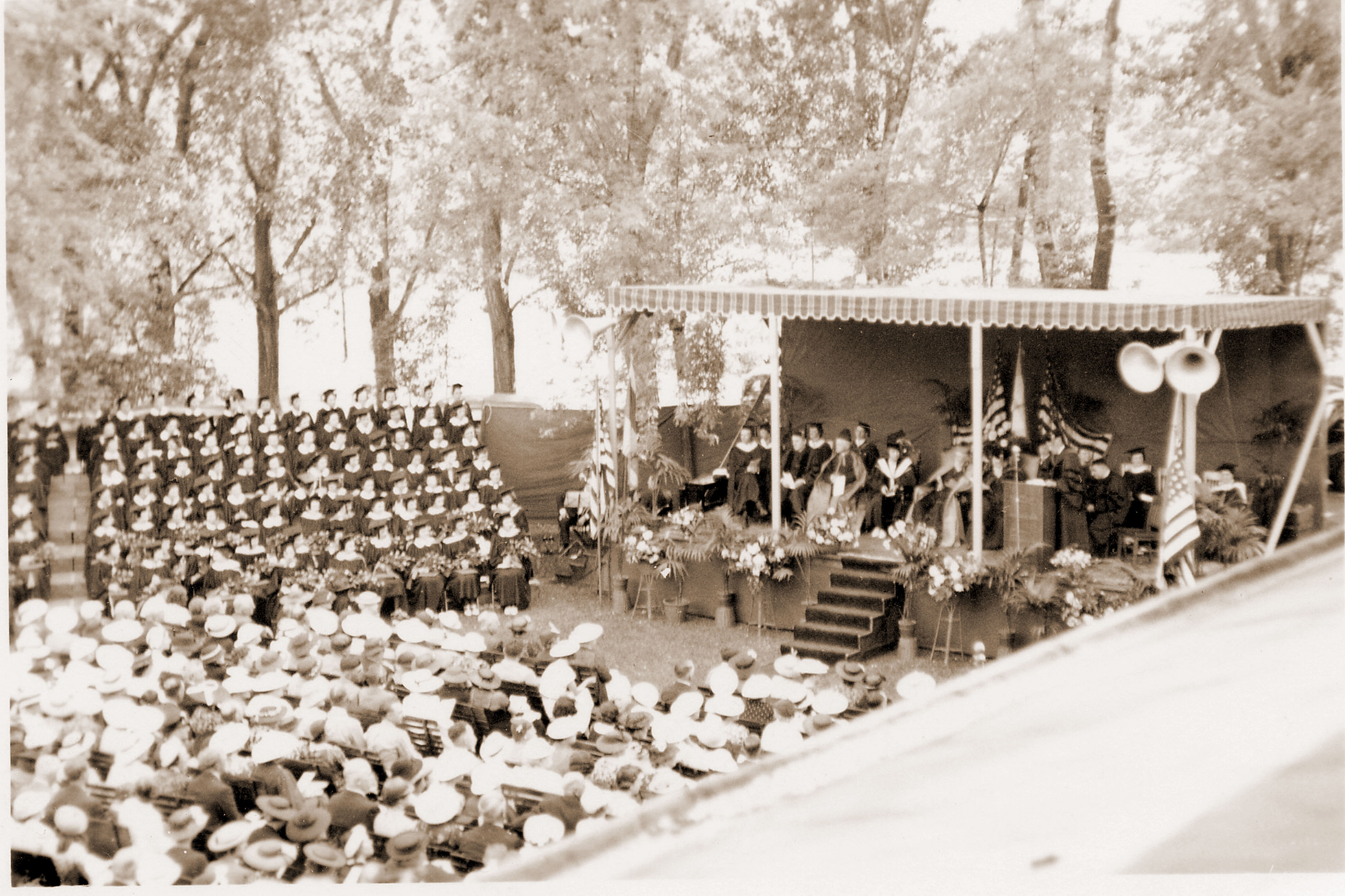
Class of '37
Commencement was held outdoors on a beautiful day in 1937.
100 years in about 100 seconds
Now a University
On June 1, 2023, Nazareth officially became Nazareth University.
"It's another time of changemakers... taking the college another step farther." — Eileen Daly, SSJ, trustee
FAQs: Nazareth University ≫
As needs changed and expanded with time, Nazareth responded.
1950s
Graduate programs were added, further developing Nazareth as a leader in quality teacher education programs and social work.
1960s, 1970s
- Nationally and internationally known speakers such as John Ciardi, Robert Fitzgerald, Edward Said, Gabriel Marcel, Dorothy Day, Rudolph Nureyev, and Costa Rica's President Oscar Arias were invited to address the students and provoke their thinking.
- The college became co-educational and legally independent of the religious congregation, to “serve all without distinction,” without compromising its original focus on academic excellence.
1980-2000s
Nazareth values experiential learning as a teaching tool, often intersecting with community-based work or projects. Nazareth approaches these opportunities with a spirit of reciprocity: The community and the college are equal stakeholders who each give and benefit.
- Faculty/staff and student trips, such as The March Bearing Witness to Hope (Germany, Poland) and Hunger and Homelessness (Philadelphia), offer students first-hand experiences related to oppression and the burning cry for justice.
- Multiple study abroad programs expand students' opportunities to experience other cultures, understand historical events that influence the 21st century, and deepen their global citizenship.
- Undergraduate research opportunities to collaborate with published faculty pave the way for graduate study, fellowships, grant opportunities, and sought-after post-doctoral awards.
- A distinguished Partners for Learning program, begun in 1994, continues to focus on advancing educational equity by building partnerships with schools, education centers, and human service organizations dedicated to alleviating poverty, housing and homelessness, addiction recovery, refugee resettlement, and youth development.

Cassandra "Cassie" Matalavage '17, '18G began tutoring Rochester elementary students during her first year through Nazareth's Partners for Learning program.
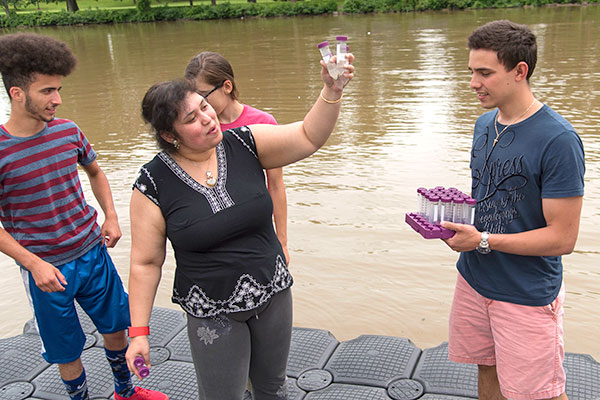
A Nazareth team, including Prof. Padmini Das, Ph.D. (hand raised), and Nazareth student Shane Fuentes '18 (right), guide high school students in investigating an algae problem in local waterways.
2010-2020
- Integrating math and science — in a distinctive curriculum and new building design — signals renewed commitment to ground-breaking innovations in the sciences (Peckham Hall)
- Aligning occupational and physical therapy with art, music, and speech therapies in the same location provides practicums for students, interprofessional learning, and full-service clinics for under- and non-insured members of the Rochester community (York Wellness and Rehabilitation Center)
- Continuing its exemplary commitment to community engagement, Nazareth is recognized as a Presidential Awardee in the 2013 President's Higher Education Community Service Honor Roll.
- Partnering with the Clinton Global Initiative University, Nazareth supports more than 40 students in their commitments to action focused on education, poverty alleviation, climate action, peace and human rights, and health.
- Experiencing state-of-the-art acoustics in the Glazer Music Performance Center showcases student musical performances as well as accommodates professional guest ensembles such as the Rochester Philharmonic Orchestra and The Society for Chamber Music.
- Collaborating with Special Olympics in a new fieldhouse on campus — Golisano Training Center — provides inclusion, fitness, and wellness for athletes of all abilities and enables Nazareth students majoring in nursing, public health, physical therapy, speech therapy, social work, art therapy, music therapy, and occupational therapy, as well as pre‐medical and pre‐dental minors and those pursuing Nazareth's unique interdisciplinary specialty program in autism (I‐SPAN), to learn and provide service through promoting wellness for all.
- Nazareth stands out for its significant number of Fulbright awards for a college of its size.
- Committing to interreligious dialogue in practice, Nazareth is proud of the ongoing contributions and programs hosted by our Hickey Center for Interfaith Studies and Dialogue, our Konar Center for Tolerance and Jewish Studies, and our Sulam Center prayer space, shared by both Nazareth’s Hillel and the Muslim Student Association.
Determined to become an equity-minded, inclusive campus, Nazareth administrators and students are committed to welcoming and creating space for all to discover their identity, inclusive of any sexual/gender orientation, race/ethnicity, religion, and socio-economic background.
Drone Flyover
We are Nazareth
2021–2025, and beyond
Through its 80+ academic programs and majors, and through community partnerships, Nazareth continues to empower its students for a life-long journey of self-awareness and discovery through passionate dialogue and lively debate. Committed to the dynamic synergy of academic inquiry, community engagement, spiritual development, and principles of justice, the College challenges students to experience new cultures, confront racism, and respond with empathy to the cry of the environment and the cry of the poor.
Emulating the passion, drive, and perseverance of the founding sisters, Nazareth students — known as the Golden Flyers — are prepared to fly: to develop a sense of purpose, to investigate and respect divergent world views across borders and cultural divides, to pour energy into creatively shaping a world of compassion, equity, and inclusivity, and to become community leaders who are authentic Changemakers.
Learn more about today’s guiding principles, which draw from Nazareth’s roots:
June 1, 2023: The name Nazareth University took effect, recognizing the significant graduate programs the institution has long offered.
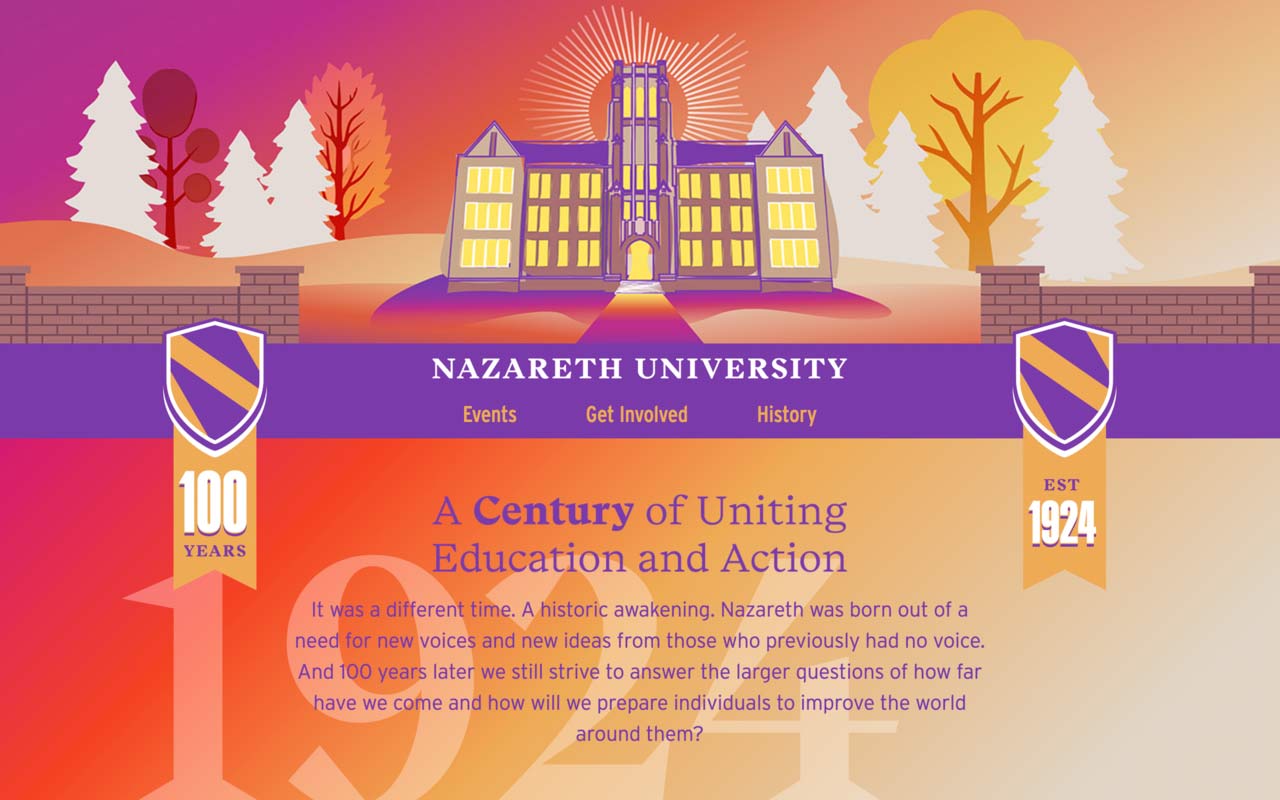
2024 marked 100 years!
College Archives
Nazareth's Archives collects, organizes, describes, maintains, promotes, and provides access to institutional records of enduring historical and research value as a resource for the Nazareth community.
For more information, contact Deborah Janetos in the Library at djaneto1@naz.edu or 389-2140.
Naz History Podcasts
- Nazareth Centennial Podcast by Professor Timothy Kneeland features people and stories from Nazareth’s first 100 years.
- Prez Paul Podcast: President Beth Paul, Ph.D., is joined by Tim Kneeland, Ph.D., professor of history and political science, and Susan Nowak, Ph.D., SSJ, professor and Shannon chair of religious studies. Listen: What Would Our Founders Do? (January 19, 2021)